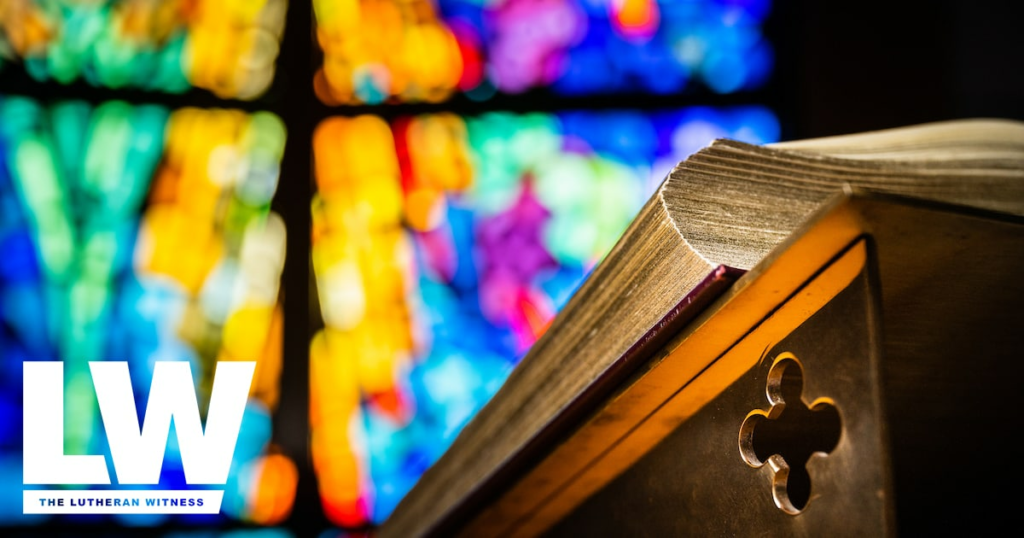by Dr. Jerald C. Joersz
Some TV evangelists and writers of popular religious books promote a view of the end times called “dispensationalism.” What is dispensationalism? How does it differ from how Lutherans understand biblical teaching about the end of the world?
Dispensationalism (or “premillennial dispensationalism”) is a teaching that divides biblical history into seven distinct periods, or “dispensations,” the last of which is referred to as the Kingdom (the millennium). Dispensationalists focus on this final stage and on discerning historical “signs” of approaching last days.
Typically—summarized here in very simplified form— dispensationalists believe that the end will take place in these stages: (1) a secret return of Christ, with a resurrection of the just and the “rapture” (believers “caught up” with Christ and taken to heaven); (2) a seven-year “tribulation” (when the Antichrist reigns and persecution occurs), with military battles leading up to the Battle of Armageddon; (3) a second, visible return of Christ followed by the sheep/ goats judgment in Matthew 25; (4) a 1,000-year visible reign of Christ on earth; (5) the resurrection of the unjust and the “White Throne Judgment”; (6) the creation of new heavens and earth.
This system of the end times* relies on a rigidly literalistic method of interpreting the Bible, including specifically books such as Ezekiel, Daniel, and Revelation—literature requiring Bible students to take seriously the symbolic language contained in them. Dispensationalists commonly believe that God pursued two purposes in His redemptive plan, one related to the restoration of the nation of Israel in the land (original purpose) and the other dealing with the Christian church (unforeseen in the Old Testament and thus called a “parenthesis”).
John Nelson Darby (1800–82), a traveling preacher, was the first to develop and spread a dispensationalist understanding of Christ’s second coming. Cyrus Scofield expanded Darby’s views and popularized them in his widely influential Scofield Reference Bible (published first in 1909).
Lutherans believe that the Scriptures describe one plan of salvation (not two, one involving national Israel and the other, the Church). That plan began when, after the Fall, God promised a Savior who would suffer and die for the sins of all, Jews and Gentiles alike. His eternal plan was fulfilled in the coming of Jesus Christ, who “was delivered up for our trespasses and raised for our justification” (Rom. 4:25 ESV). Through faith in Him, all believers are united in His one holy Christian church, the “Israel of God” (Gal. 6:16). Christians await with expectation Christ’s second and only coming at the end of time (the 1,000-year reign referring symbolically to the time between His Ascension and His second coming—a position called “amillennialism”). They find comfort, not in law-oriented end-time speculations, but in the Bible’s central message, the good news of God’s forgiveness, life, and salvation in Christ.
* For details and an evaluation, see the CTCR’s reports on The End Times and A Lutheran Response to the “Left Behind” Series at: https://resources.lcms.org/reading-study/ctcr-library-bible-studies-and-discussion-guides/.
About the Author: Until his retirement, Dr. Jerald C. Joersz was an associate executive director of the LCMS Commission on Theology and Church
Relations.
Send your questions to “Q&A,” c/o The Lutheran Witness, 1333 S. Kirkwood Road, St. Louis, MO 63122-7295. Please include your name and address. All questions will be considered, but none can be answered individually.






Fourth paragraph of this article begins with: “This system of the end times relies on a rigidly literalistic method of interpreting the Bible…” Most fundamentalists would wear that criticism as a badge of honor. In fact, the biggest problem with premillennial dispensationalism is that it is a church-based alternative to fortune-telling. Most Christians acknowledge divination peddlers (astrologists, psychics, palm readers, etc.) as practitioners of sorcery. Yet too many Christians want the Bible to be a huge fortune cookie or the church’s crystal ball. Call it “prophesy” and that makes everything OK, right? WRONG! Fortune-tellers pander to fear of the future. Faithful Christians “fear not” (it’s one of the most frequently repeated phrases in Scripture). God’s grace is sufficient.
LINK SEEMS TO BE BROKEN…
* For details and an evaluation, see the CTCR’s reports on The End Times and A Lutheran Response to the “Left Behind” Series at: http://www.lcms.org/pages/?509.
Fixed. It’s in a list of resources at the new link.
I’m attending a Bible lesson an evangelical church that is hardcore teaching dispensationalism. The rapture, the tribulation period, the Jews getting a second chance at salvation because they are Gods chosen people, micro chips being the mark of the beast, the works!! and I’m having a hard time understanding how they can seriously say all these things that come with a lot of added on theology.
Thank you for this very clear definition of dispensation. I found in my library a copy of a scholarly book titled “Footsteps of the Messish” by Dr. Arnold G Fruchtenbaum.” It looks at historical events up to the present time in support of this understanding and of course to the future.
I became interested in the dispensationalist theology when a Christian friend, not Lutheran, talked of the 10 Horns mentioned in Revelation being the 10 nations now being the recent formation of the BRICS which now number 10. Also the sign of the beast also mentioned in Revolution seems to fit with new technologies already being used by China to permit or deny travel requests and even food. The use of CBDCs is being proposed by the WEF as a global currency to replace physical currency and existing digital currencies for total control and suppression of free speech and religion. The Biden administration is firmly behind this change.
I have read “Footsteps of The Messiah” by Arnold Fruchtenbaum and refer to it often. It is the best source to clearly explain Bible prophecy that I have found.